About Us
The History and Philosophy of the Japan P.E.N. Club
The Japan P.E.N. Club was founded on November 26, 1935 as the Japanese centre of International P.E.N., which has its headquarters in London. By 1935, Japan, having left the League of Nations in the wake of the Manchurian Incident, was being pushed in the direction of international isolation. This was a cause for concern among liberal literary figures and diplomats, and it was against this backdrop that the Japan P.E.N. Club was founded in response to a request by International P.E.N. in London with the voluntary support of the leading novelists, poets, foreign literary figures, and critics of the day. Major novelist Toson Shimazaki served as the organisation’s founding president, which also played the role of the Japanese centre of International P.E.N. Even when the suppression of free speech became severe during the subsequent Sino-Japanese and Pacific wars, the Japan P.E.N. Club maintained contact with the London office, protecting its unique position as a window to the world throughout this period.
The Japan P.E.N. Club is a gathering of poets and playwrights (P), essayists and editors (E), and novelists (N), who subscribe to the philosophy, as reflected in the reasons for its founding and its subsequent history, of seeking peace and opposing all forms of suppression of freedom of expression. The Japan P.E.N. has been a leader in the Japanese press throughout its history; carrying out all of its activities based on the principles of independence and self-respect without receiving any subsidies from national government or organizations. The role of president of the Japan P.E.N. Club in each era has been filled by some of the most influential and representative novelists of the day.
Ex-presidents
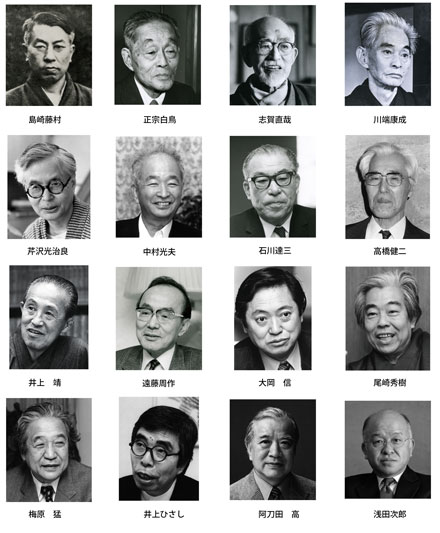
Ex-presidents
| Name | Term | Year/ Birth-Death | |
|---|---|---|---|
| 1st | Toson Shimazaki | 1935-1943 | 1872-1943 |
| 2nd | Masamune Hakucho1943-19471879-1962 | ||
| 3rd | Naoya Shiga | 1947-1948 | 1883-1971 |
| 4th | Yasunari Kawabata | 1948-1965 | 1899-1972 |
| 5th | Kojiro Serizawa | 1965-1974 | 1897-1993 |
| 6th | Mitsuo Nakamura | 1974-1975 | 1911-1988 |
| 7th | Tatsuzo Ishikawa | 1975-1977 | 1905-1985 |
| 8th | Kenji Takahashi | 1977-1981 | 1902-1998 |
| 9th | Yasushi Inoue | 1981-1985 | 1907-1991 |
| 10th | Shusaku Endo | 1985-1989 | 1923-1996 |
| 11th | Makoto Ooka | 1989-1993 | 1931- |
| 12th | Hotsuki Ozaki | 1993-1997 | 1928-1999 |
| 13th | Takeshi Umehara | 1997-2003 | 1925- |
| 14th | Hisashi Inoue | 2003-2007 | 1934-2010 |
| 15th | Takashi Atouda | 2007-2011 | 1935- |
| 16th | Jiro Asada | 2011-2017 | 1951- |
| 17th | Sinobu Yoshioka | 2017-2021 | 1948- |
| 18th | Natsuo Kirino | 2021- | 1951- |
The Board
President; Natsuo Kirino
Vice president; Bin Konno, Mitsuyoshi Numano, Kenta Yamada
Managing director ; Satoshi Gunji
Executive director; Ayako Sato, Dorian Sukegawa, Shin Tokunaga, Akira Nogami, Eto Mori
Board; Jiro Asada, Yuko Ito, Shoko Egawa, Shigenori Kanehira, Yasumasa Kiyohara, Ayako Sakuma, Kenji Shishido, Setsuko Shinoda, Akihiro Shima, Akiko Shimojuu, Etsuko Suzuki, Chihaya Takahashi, Seiichiro Takita, Tatsuro Dekune, Atsuo Nakamura, Masaaki Nishiki, Sinya Miyazaki, Midori Mori, Shinobu Yoshioka, Chia Yoshida
Controller; Satoshi Katsuo, Toshio Kawaguchi, Takafumi Kutsuwada,
(Until June 2023)
The board consists of up to 30 members of which up to 20 be elected by the vote of the members and 10 be appointed by the president.
The board is the electoral body of the President, vice presidents, managing director, executive directors supervise the operation of the Japan.P.E.N.
The President will appoint each chairperson of the committees.
The president, vice presidents, managing director, executive directors has regular meeting to discuss the daily operation and the direction of Japan P.E.N.
The Japan P.E.N. Club and International PEN
The Japan P.E.N. Club was established in 1935 and, with 1,900 writers currently participating, it is now one of Japan’s foremost cultural organizations. Operating as a non-profit organization, we endeavour to promote international cultural cooperation and protect freedom of speech, freedom of expression and freedom of the press.
The Japan P.E.N. Club is also an International PEN member centre. Today International PEN has 144 centres in 102 countries, and as the world’s only international writer’s organization it acts based on the following principles: “the international exchange of literature and ideas,” “freedom of speech, freedom of expression, and freedom of the press,” and “contribution to world peace.” Reflecting our belief that literature, by nature, serves to portray a wide range of phenomenon from the inner state and daily life of the individual to the current state of society and the world, The Japan P.E.N. Club has continued to act in accordance with the International PEN Charter.
Activities
International P.E.N. Conferences Held by the Japan P.E.N. Club
May 1957: The 29th International P.E.N. Conference in Tokyo
November 1972: The International Forum on Japanese Cultural Studies in Tokyo and Kyoto
May 1984: The 47th International P.E.N. Conference in Tokyo
November 1996: Asia Pacific P.E.N. Conference
Recent Lectures and Symposiums Held by the Japan P.E.N. Club
February 2008: World P.E.N. Forum “Natural Disaster and Culture”
October 2006: “Literature and Movies” Symposium in Chiba held in cooperation with Chinese P.E.N.
September 2006: “What is a Writer in the Modern Age?” Symposium in Tokyo
March 2006: The 22nd “Day of Peace” Forum in lwate Prefecture
February 2006: The 5th “Think War and Peace Now” Symposium in Tokyo
December 2005: The 25th “Day of Writers in Prison” Forum in Tokyo
“Day of Peace” Symposiums
The Japan P.E.N. Club in 1984 in its capacity as the host of the 29th International P.E.N. Congress in Tokyo made a proposal, which was subsequently approved by the congress, to designate March 3, the date of Japan’s time-honored girls’ festival called Hinamatsuri (Doll’s Festival), “The Day of Peace” and that all the International P.E.N. centres around the world run activities to promote peace that day. Since then, the Japan P.E.N. Club has held symposiums on the Day of Peace in 23 prefectures. 2006’s symposium, which was held in Morioka City in lwate Prefecture, was attended by 1,800 people, and it was extremely well received.
Our E-mail Magazine, P.E.N.
The Japan P.E.N. Club has been issuing its e-mail magazine, P.E.N., once or twice a month since 2003 in order to improve public awareness of P.E.N. The magazine has a readership of more than 1,500 members of the general public. The magazine includes speeches made by popular writers at P.E.N. members’ meetings, announcements of symposiums and lectures to be held by Japan P.E.N., and newly released books edited by Japan P.E.N.
Editing of Books and Planning Publishing Projects
The Japan P.E.N. Club has planned and edited more than 100 books, collections of short stories, and essays. They are sold at bookstores nationwide, and some volumes have sold more than 100,000 copies.
Operation
Based on its philosophy of independence and self-respect, the Japan P.E.N. Club raises most of the funds for its operation from membership fees.
The Club’s activities are run by its 13 committees with the approval of the annual General Meeting and the Board of Directors, which in principle convenes once a month. There are 40 directors, of whom 30 are elected by the votes of the members and 10 are designated by the president. The president is elected in a mutual vote by the directors. Journalists may observe the General Meeting and meetings of the Board of Directors: the outstanding feature of the Club’s operating structure is its openness. The discussions at these meetings are shared with all members in minutes reported in the Club’s monthly bulletin.
Objectives
The P.E.N. Charter states that members “pledge themselves to do their utmost to dispel race, class and national hatreds, and to champion the ideal of one humanity living in peace in one world” and that “P.E.N. stands for the principle of unhampered transmission of thought within each nation and between all nations; members pledge themselves to oppose any form of suppression of freedom of expression in the country and community to which they belong as well as throughout the world whenever this is possible. P.E.N. declares for a free press and opposes arbitrary censorship in time of peace.” Based on the intent of the Charter, the stated objective of the Japan P.E.N. Club is to protect freedom of speech, expression, and the press to contribute to the world peace. The Japan P.E.N. Club conducts the following activities aimed at achieving this objective.
1. Activities aimed at promoting literature
2. Activities aimed at promoting international understanding and cultural exchanges and activities aimed at the protection of freedom of speech, expression, and the press
3. Cooperation in the projects of International P.E.N.
4. Holding of study groups, round-table conferences, and lectures in order to educate people about the P.E.N. Charter and promote its aims
5. Publication of the Club bulletin and various pamphlets
6. Activities aimed at introducing Japanese literature to foreign audiences
To become a voluntary expert member
A voluntary expert is a person who is a foreign researcher or student who contributes to the Japan P.E.N club by using her or his expertise such as the linguistic abilities.
To become a guest member
A guest member is an honorable person who contributes to the Japan P.E.N.’s activities or a person who belongs to another center but stays temporally in Japan.
To become a supporting member
An individual or a corporation who makes the financial contribution to Japan P.E.N club, would be recommended by the board as the supporting member.
To become a member
P.E.N. is the international organization and there are a lot of local centers around the world. If you have your works published in some foreign country, please contact the local PEN center.
If you are already a member of some center and you would like to participate in the activities of Japan P.E.N Club see the guest member
If you have more than two literary published books in Japan, then you are eligible to become a member of Japan P.E.N club.
Member should subscribe the philosophy of seeking peace and opposing all forms of suppression of freedom of expression as stated in the P.E.N. Charter
See Charter,
To solicitate to the membership, you need two recommendations, one from the board member and one from the member.
You will belong to either P= Poet、Play writer、E=Editor、Essayist、N=Novelist categories.
Please fulfill the application form for the membership and send it to the secretariat.
For further information contact the secretariat.
If you become a member;
You receives a bimonthly newsletter and you can attend the monthly members’ gathering and other events, the annual assembly, Kyoto gathering and the Congress of International P.E.N.
Note: The Japan P.E.N Club is sometimes confused with The Japan Writer’s Association (J.W.A.). If you wish to consult your interests as the professional writers ( such as the your intellectual properties, pension, health care), please contact the J.W.A.
How to participate in our activities
If you would like to participate in the activities of Japan P.E.N. Club, there are several ways to do so.
Activities of the Writers in Prison and human rights committee of the Japan P.E.N. Club
1981 October The first “Day of Writers in Prison” forum (thereafter held once every year)
1993 A fact-finding mission was sent to South Korea. Members met with imprisoned novelist Hwang Sok-yong. A letter calling for his release was sent to the South Korean government. A symposium was held on Writers in Prison Day (Thursday, October 7).
1994 A fact-finding mission was sent to China (Beijing and Hong Kong). Based on information gathered by the mission, a panel discussion titled “Writers in China Today” was held on Writers in Prison Day (Thursday, October 18).
1995 A fact-finding mission was sent to Indonesia and Burma (Myanmar). On Writers in Prison Day (Thursday, October 5), a report was presented on writers in those two countries, and a panel discussion titled “Fifty years after the war: What kind of Japan do we live in today?” was held. In addition, a taped message was presented from Aung San Suu Kyi, who mission members met in Burma, and messages were also presented from Indonesian writer Pramoedya Ananta Toer and others.
1996 Under the title of “Thoughts on Writers in Prison Day: The Prison Created by the Mass Media,” a panel discussion was held on the topic of whether freedom of expression is truly being protected in an environment of overheated media scrutiny.
1997 After visiting a Vietnamese writers association and other organizations as a Vietnam goodwill exchange group, members investigated the current status of writers in prison in Vietnam. On Writers in Prison Day (October 2), a report was presented on the current situation of Vietnamese writers.
1998 On Writers in Prison Day, a symposium was held on the topic “The Democratization of China (Wei Jingsheng and the Tiananmen Square Incident).”
1999 The Writers in Prison Day (October 7) theme was “Ethnic Nationalism and Today’s World.” A symposium was held focusing on the issue of peace and the conflict in Bosnia and Herzegovina. At the end of November, members visited politically unstable East Timor (area now called Aceh) to investigate the situation for journalists and other writers there. With the deterioration of conditions in the Yugoslavia region, a letter was sent to President Slobodan Milosevic protesting the repression of journalists and other writers in Kosovo and a letter was sent to the secretary general of NATO calling for a halt to aerial bombing.
2000 The Writers in Prison Day (October 5) theme was “Literature and Prison.” A panel discussion focused on the issue of human rights in Japanese prisons and also considered the situation in Latin America. An interview was held with a formerly imprisoned Indonesian writer who was visiting Japan, and opinions were exchanged with a formerly imprisoned writer from Burma (Myanmar). Based on the principle of freedom of expression, letters were sent to the Chinese government calling for release of three journalists detained or arrested there, and to the government of Burma (Myanmar) calling for immediate and unconditional release of two journalists detained or arrested there.
2001 Responding to the Chinese government’s detainment of Chinese writer Tohti Tunyaz, an ethnic Uyghur, on Writers in Prison Day (October 4), a movement was initiated to collect petition signatures from PEN members and others. The end result of this action was that a petition calling for his release was sent to the Chinese government on March 27, 2002 with an attached list of more than 300 supporter signatures by PEN members and others. In addition, Tohti was made an honorary member of the Japan P.E.N. Club, and International PEN headquarters was informed. Released following the end of his 11-year sentence, Tohti returned home on February 10, 2009. Carried over from the previous year, the theme of the 21st Writers in Prison Day was “Literature and Prison II.” The activities included two debates and readings of the poems of poets involved in protests in China.
2002 This year’s Writers in Prison Day event was held outside Tokyo for the first time. It took place on October 6 (Sunday) under the title: Japan P.E.N. Club Forum “The Power of Literature, Adventures of Expression.”
2003 For Writers in Prison Day (October 7), exiled Chinese writer Zheng Yi was invited to attend from America, and he took part in an event titled “Writing for Freedom – A Dialogue Between Exiled Chinese Writer Zheng Yi and Kenzaburo Oe.” Their discussion of the freedom to write was greeted with wide interest.
2004 The 24th Writers in Prison Day event was held on the Kagoshima Prefecture island of Amami Oshima. Under the theme “Prison of Language – Beginning Again with Dialect,” participants discussed the brilliant possibilities of dialect.
2005 At the time, there was a succession of incidents involving the detaining of Internet journalists, with one case being the arrest of Shi Tao, a reporter for the Contemporary Business News, a daily newspaper in China’s Hunan Province. He was charged by the Chinese government with leaking state secrets after his personal information was disclosed by Yahoo Hong Kong. Under the name of the Japan P.E.N. Writers in Prison and Human Rights Committee chairperson, a series of appeals were made for their immediate and unconditional releases. The 25th Writers in Prison Day featured the theme “Do you know Vietnam? – Literature and Human Rights in Southeast Asia.” Under this theme, panel discussions were held about current conditions in Vietnam and the rest of Southeast Asia. In addition, responding to the ongoing rash of incidents in China, Vietnam, and elsewhere involving the detainment or arrest (on charges such as “leaking state secrets”) of journalists and other writers publishing writings and commentaries on the Internet, the Japan P.E.N. Writers in Prison and Human Rights Committee issued an appeal each time such a case was reported.
2006 Wei Jingsheng is a formerly imprisoned Chinese writer, who was arrested following the Tiananmen Square Incident of 1976 and released in 1997. He now lives in America. During a trip to Japan in 2006, he visited the Japan P.E.N. Club, exchanging views on topics such as his activities in America and the activities of the Writers in Prison and Human Rights Committee.
2007 With anti-government demonstrations expanding in Burma (Myanmar), a Japanese journalist was killed during the military government’s severe suppression of a demonstration. On October 9, 2007, the Japan P.E.N. Club issued a statement that protested the latest moves by Myanmar government to suppress free speech, the killing of the Japanese journalist, the detention of Buddhist monks as well as other residents, and that also called for the restoration of freedom of speech.
2008 With the Beijing Olympic Games approaching, tension was high in China, and there was a crackdown on protest activities in Tibet. On March 26, 2008, the Writers in Prison and Human Rights Committee issued a statement expressing concern over the situation in Tibet and calling for freedom of speech and respect for human rights. Through the Poem Relay planned in conjunction with the Beijing Olympics, the Japan P.E.N. Club participated in a protest against China’s repression of free speech and human rights. In addition, in response to the Chinese government’s detention of Dr. Liu Xiaobo, an ex-chairman of the Independent Chinese PEN Center, a statement was issued on December 22, 2008, calling for the immediate release of Dr. Liu Xiaobo by the Chinese government. The Writers in Prison and Human Rights Committee also called for electronic signatures from members supporting a statement to the Chinese government “protesting the long-term detention of Dr. Liu Xiaobo, a former chairman of the Independent Chinese PEN Center and well-known dissident writer.” Thirty Japan P.E.N. Club members signed the statement.
2009 A statement was issued on August 11 to protest the conviction of Aung San Suu Kyi and to call for an immediate and unconditional end to her house arrest. This statement strongly protested the guilty verdict and three-year prison sentence handed down to Aung San Suu Kyi by a special court in Yangon, Myanmar.
2010 A statement was issued on January5 to call for the government of the People’s Republic of China to reconsider the unjust Sentencing of Dr. Liu Xiaobo and grant his immediate release.
The special exhibition and the public event was organized during the International Congress Tokyo 2010 to commemorate 50 years of International PEN WiPC.
The special Empty Chair made for the Japan PEN Club was exhibited during the Congress and the exhibition.
The writers in Prison and human rights committee of the Japan P.E.N. Club
Freedom of expression has been a linchpin of International PEN since its formation in 1921. Concerns for colleagues imprisoned, executed, tortured through times of war, peace, revolution, and détente took the form of speeches at congresses, resolutions, letters of support, telegrams to offending governments and an embrace of exiled writers.
The Writers in Prison and Human Rights Committee of the Japan P.E.N. Club dispatches fact-finding missions to investigate the repression of writers and the current status of journalists and other writers in prison, focusing primarily on Asia. It also holds “Writers in Prison Day” activities once a year.
Empty Chair
There is a chair with no one sitting in it, placed in the room at the International PEN congresses and at PEN events held worldwide. The people who should be sitting in this chair are the writers in prison and other writers who are prevented from acting freely and cannot participate in the activities of PEN. We place the empty chair in the room as a silent protest expressing the importance of freedom of expression, while looking for the day when the people who should be sitting in the chair can sit in it.
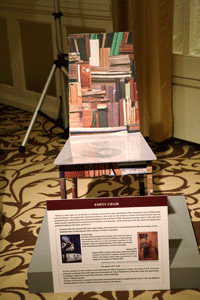
On the occasion of the holding of the International PEN Congress in Tokyo, the Japan P.E.N. Club has produced an Empty Chair with help from the students at Tokyo Polytechnic University under the supervision of designer Yukiko Kure (a part-time instructor at the university).
Title is ” Missing Words”
The back of the chair is covered by the books printed and the seat is coated like the mirror. From the different standing points of view, it reflects the banned words in the silence. (Installed in the conference room of the W.i.P.C in the International PEN Congress Tokyo 2010)
1985
-Holding of the First Day of Writers for Peace Gathering on March 3, 1985-
The Day of Writers for Peace was established in the Peace Committee at the 47th International P.E.N. Congress in Tokyo in May 1984 and the intention to achieve universal freedom and peace through specific anti-nuclear policies was incorporated into the meeting, so this congress was an opportunity to enhance the value of the presence of the Japan P.E.N. Club in International PEN.
. The day was established to hold campaigns wishing for peace at PEN centers all around the world on the same day every year. The Japan P.E.N. Club held the first Day of Writers for Peace gathering at the Sogetsu Hall in Akasaka, Tokyo on March 3, 1985. This day was chosen because it is the day of the Momo no Sekkku (Girls’ Festival) and Hinamatsuri (Dolls’ Festival) in Japan.
At the meeting of the Writers for Peace Committee held in Bled, Yugoslavia (now Slovenia) in May that year agreement was reached that the day proposed by the Japan P.E.N. Club, March 3, was the most suitable date for avoiding war in the countries of the world and the committee decided to hold the Day of Writers for Peace permanently on this date beginning with the second Day of Writers for Peace in 1986.
The first Day of Writers for Peace gathering is held in Tokyo (thereafter held on the same day every year)
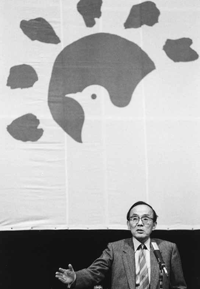
6th Day of Writers for Peace gathering in Shizuoka
Shusaku Endo (1990)
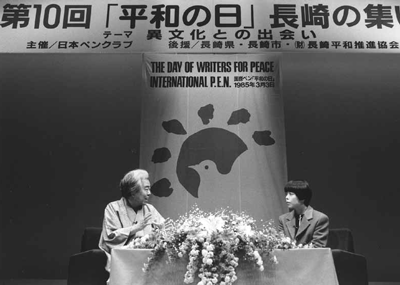
10th Day of Writers for Peace gathering in Nagasaki
Hotsuki Ozaki (left) and Machi Tawara (1994)
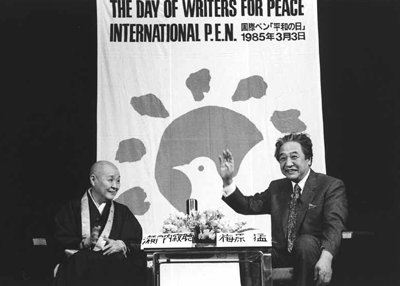
12th Day of Writers for Peace gathering in Kyoto
Jakucho Setouchi (left) and Takeshi Umehara (1996)
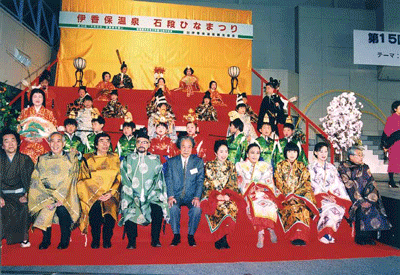
15th Day of Writers for Peace gathering in Ikaho
Writers dressed as hina ningyo (ornamental dolls) (1999)
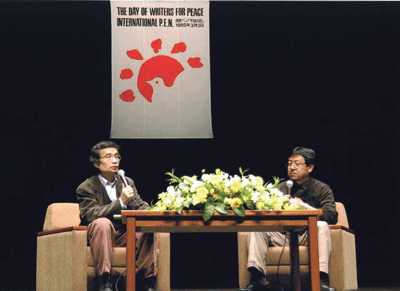
20th Day of Writers for Peace gathering in Biwako
Wahei Tatematsu (left) and Baku Yumemakura (2004)
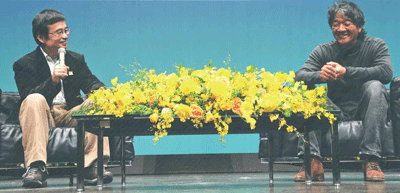
24th Day of Writers for Peace gathering in Beppu
Wahei Tatematsu (left) and Makoto Shiina (2008)
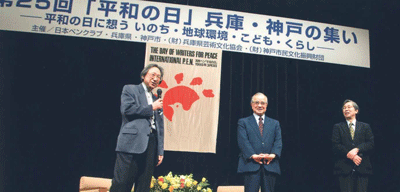
25th Day of Writers for Peace gathering in Kobe, Hyogo Prefecture
From left, Susumu Nakanishi, Takashi Atoda, and Chihaya Takahashi(2009)
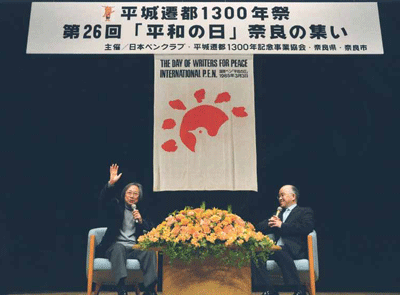
26th Day of Writers for Peace gathering in Nara
Susumu Nakanishi (left) and Jiro Asada (2010)
